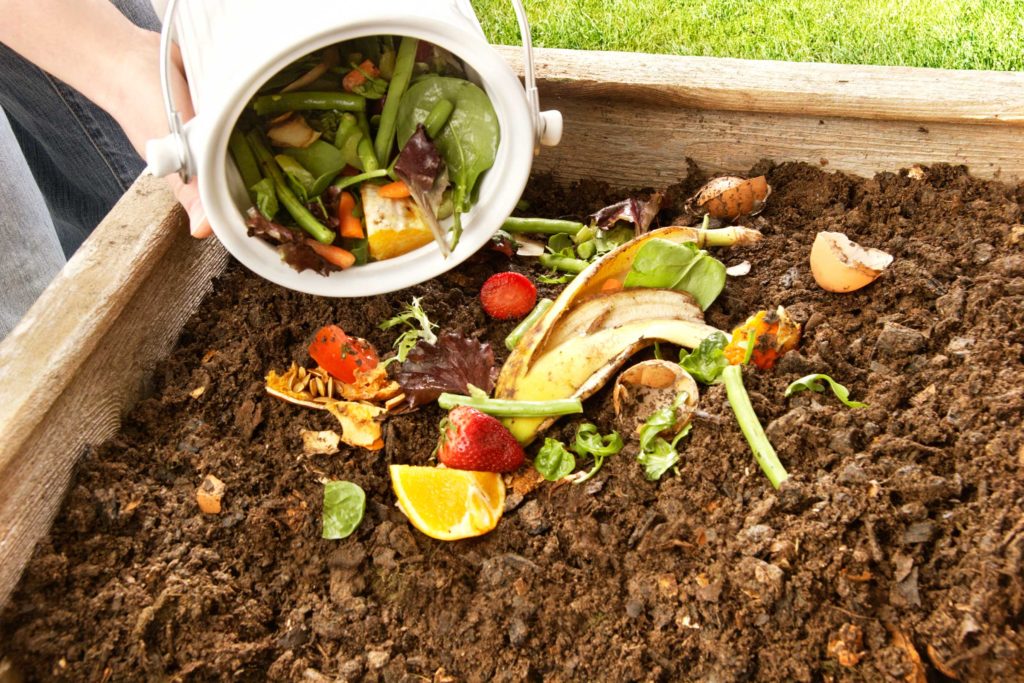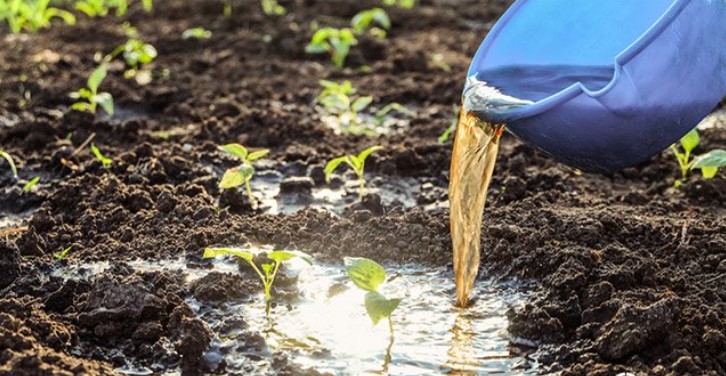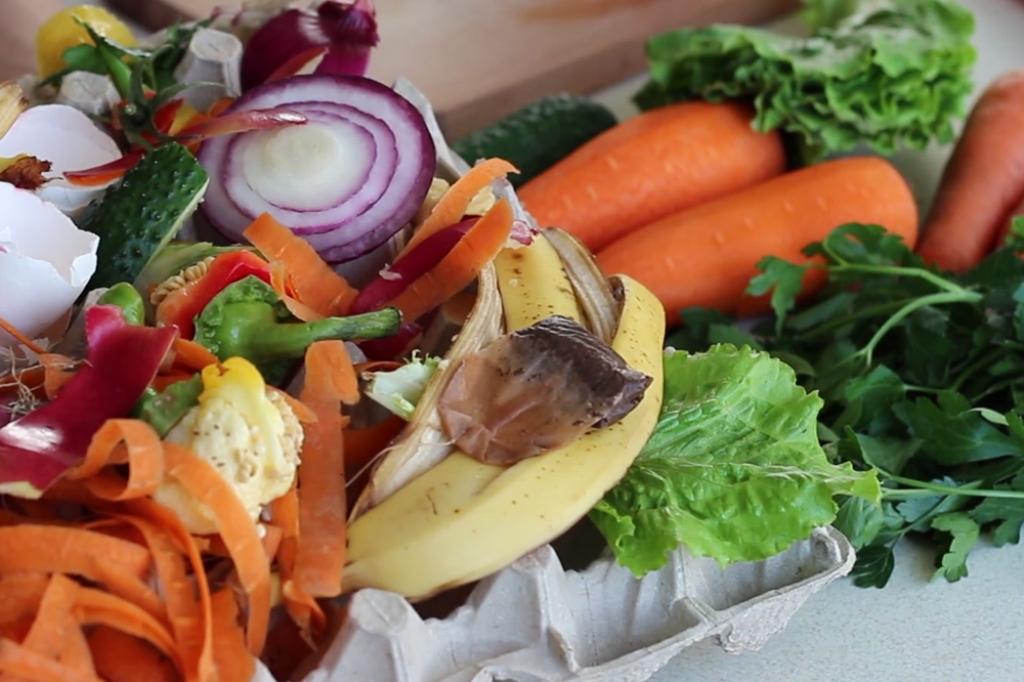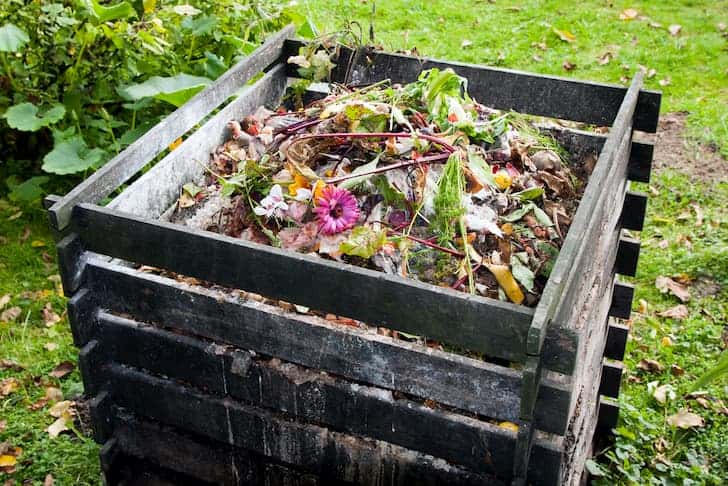The vast majority of food waste is thrown away in the trash or disposed of at the garbage disposal, which is a waste of resources when you consider that these materials can be converted into useful fertilizer through decomposition.
Fertilizer from kitchen waste can be made by using the process of Compositing. Compositing is a technique for converting compostable organic materials into useful fertilizer, such as that found in food waste.
You can follow these steps to make organic fertilizer out of kitchen waste using compositing:
- Look Through Your Kitchen Waste
- Add Other Organic Waste
- Collect Some Garden Waste
- Create the Compost
- Apply Your Homemade Fertilizer in Your Garden
It is clear that the principles you apply in organic farming directly impact your health and the health of the planet. A range of organic garden fertilizers can be used in both your garden and potting soil to improve the quality of your plant’s growth. There is a possibility that some of these fertilizers can be made or harvested at home utilizing items found in your pantry or backyard. In addition, Composting can be an effective and environmentally friendly technique for disposing of food waste in your kitchen because it has a high concentration of organic components. The step-by-step instructions on how to make fertilizer from kitchen waste can be found in the following section.
Is it Possible to Compost Food Scraps From the Kitchen?
Composting is a straightforward process that involves simply dumping waste into a composter of your choosing. However, there is one thing to keep in mind. Compost is created from a variety of sources, not just food waste. It is essential to put a balanced mix of green and brown materials into the composting mixture of your composter. Brown things include small wood particles or sawdust, a simple example. Brown matter can be found in abundance in the remains of dead leaves. It is better to collect and preserve dried leaves in the fall so that they can be used throughout the year.
Wood ash and sawdust can be added to the compost pile to speed up the composting process. Having a few livestock will assist in reducing the demand for additional manure in the compost. It’s possible to purchase sawdust or dung from a gardening supply store if you don’t have access to either at your residence. In addition to brown biological matter, it is possible to use shredded paper or cardboard for the brown organic matter. Cutting your kitchen garbage into small pieces that are no more than an inch in length will help expedite turning your waste into compost.
Bacteria have a larger surface area than other organisms, which allows them to break down tiny particles more quickly. Therefore, it is essential that the compost bin includes a handle that can be spun in order to ensure adequate mixing of the compost and the addition of oxygen to the mixture during the composting process. In addition, it is necessary to have some holes in the side of the compost bin so that excess moisture may be expelled as the compost is turned and turned again. According to experts, compost bins should be spun 2 to 3 times every day in order to achieve maximum effectiveness.
Also Read: What are the Advantages of Synthetic Fertilizers?
The final step is to apply the fertilizer evenly across the field of crops. This can only be accomplished after the compost has darkened and reached the consistency of soil. It is imperative that you begin spreading it as soon as you become aware of it. A garden fork should be used to spread compost over the garden fields, which will then be fertilized. The application of compost must be made in precise amounts. Once the fertilizer is applied, it will take some time to feel its effects. Composting your kitchen waste eliminates unwanted garbage and provides fertilizer that may be used to grow flowers or vegetables.
Steps to Turn Kitchen Waste into Organic Fertilizer

Compositing is a technique for converting compostable organic materials into useful fertilizer, such as that found in food waste. It is a practical and environmentally friendly means of disposing of kitchen waste. Using kitchen waste, such as leftovers and other food waste, you can create a nutrient-rich organic product that can be used to grow your own vegetables or flowers. Follow these steps to make your own organic fertilizer out of kitchen waste using simple techniques.
1. Look Through Your Kitchen Trash To See What You Can Find
Peels and other vegetable and fruit remains, such as the skins of fruits and vegetables, are the most important food waste to store. Nuts, overripe produce, and eggshells should all be stored in a cool, dry environment to maintain their quality. Fats, oils, fatty meats, and milk products should not be included in your compost since they will cause your compost pile to become soggy and foul. Ensure that the area is well-drained, level, and open so that the wood ash can contribute to the composting process’s speed.
2. Other Organic Waste Should Be Composted
You can also use sawdust in the composting process to expedite the process. If you have excess livestock manure on your property, it can be composted to help the environment. In the event that you don’t have access to sawdust and manure at home, you can get them from gardening supply stores in your area.
3. Collect Some Garden Waste To Put In The Recycle Bin
If you want to generate a high-in nutrients fertilizer, you’ll also need to incorporate some natural waste into your compost. This can be accomplished by collecting grass clippings and leaves from your lawn. When you mow your lawn, all of the organic waste from your lawn will be sucked into the lawnmower bag. After you’ve cleaned out your lawnmower’s waste, place it in your compost bin after you’ve removed everything else.
4. Composting is a Core Activity
Mix in the prepared kitchen rubbish with the garden debris that is already in the compost bin to make a compost pile. A handle should be provided on the compost bin in order to ensure that the compost is thoroughly mixed and that oxygen is properly incorporated into the compost. In addition, you should make certain that your compost bin has some vents on the side so that excess moisture may be released when you spin the container. Gardeners recommend turning compost bins two to three times per day.
5. Increase Soil Fertility By Adding Organic Fertilizer
A dark-colored compost mixture is the product of a significant amount of time and effort put into its preparation. When the compost has reached this stage, it is ready to be spread. Using a garden fork, spread the compost over the garden sections that you want to fertilize. Before applying additional fertilizer, wait a few days to see how it impacts the regions already sprinkled with compost. The garbage from the kitchen can be composted for a variety of purposes, including waste reduction and the provision of fertilizer for your garden. Before tossing food scraps into the garbage, check to see if they may be composted.
Steps To Create Liquid Fertilizer From Kitchen Waste

Fertilizers in liquid form are referred to as liquid fertilizers because they contain minerals and vitamins that are beneficial to plants. By sprinkling or pouring them directly on the roots of plants, you can ensure that they are properly absorbed. Kitchen waste, worm castings, grass clippings, and coffee grounds can all be composted in water to produce liquid fertilizers, which can be applied to plants.
You’ll need to collect vegetable peels, rotten fruits, and anything else that can disintegrate quickly in order to make liquid fertilizer from kitchen waste, so start collecting now. We’ll place this garbage in a container and leave it for a week to decompose before disposing of it properly. A good source of plant-growing nutrients such as iron, potassium, nitrogen, phosphorus, and calcium can be found in liquid fertilizer formulations.
Also Read: The 5 Best Fertilizer for Corn & Get the Most of Yields Faster
Choosing The Right Kitchen Waste For Liquid Fertilizer Is Important
Trash that can readily disintegrate, such as vegetable peels, broken fruits, and leaves that have been thrown away, should only be used. Because it can attract maggots and provide an awful odor, animal excrement should not be used in the compost. Your waste must be able to disintegrate in water over a period of one to two weeks in order for it to be considered recyclable.
Making Liquid Fertilizer From Waste Is Smart
Following the collection of all of your kitchen trash, you’ll need a huge plastic container to store it all. Fill the bucket with water all the way to the top of the handle. Covering the bucket with a lid and leaving it outside in the sunlight can keep it fresh. In other cases, it may take more than a week to remove the liquid fertilizer from the waste stream. Once the bacteria in the bucket begin to degrade the waste, the excrement may smell horrendous. Wearing a face mask can help to cover the bad odor emanating from the waste.
Take The Liquid Fertilizer And Put It In A Container For Later Use
Because kitchen waste contains a variety of compost, each of which has a different composting life, the liquid fertilizer can be collected after a week. Because of the high temperature in a hot region, the method may be more efficient than in a cold climate. It is advisable to stir the waste every other day in order to speed up the breakdown process. After a few days, use a mesh strainer to collect the dark-colored liquid waste that has accumulated.
Water must be used ten times as much to equal the total volume of liquid waste. If there is any alcoholic content in the trash, this will dilute it significantly. This beverage contains a high concentration of nutrients. Using this liquid fertilizer once a week can help you get excellent results with both indoor and outdoor plants and your kitchen garden.
Kitchen Wastes That Are Good For Your Plants

Many sorts of kitchen garbage go untreated because you don’t consider them anything other than garbage. Those wastes, on the other hand, are not garbage at all. You can use the leftover ingredients as fertilizer in your garden. Due to growing public awareness, plantation and home gardening are becoming increasingly appealing options for many people. Many people like gardening as a recreational activity and choose to grow their organic products in their backyards. Kitchen scraps, such as those described below, are the most useful to your plants because they are high in nutrients.
- Used Tea or Green Teabags
There’s no better option than tea or green tea when it comes to feeding your plants. Use tea bags or loose leaves in the soil around the roots of your plants, rather than burying them, to encourage root growth instead of burying. The breakdown of the tea bag will benefit the plants, but it will also assist in the absorption rate and the suppression of weeds. Composting tea bags are an environmentally responsible method of disposing of trash that is beneficial to the health of all of your plants, as it encourages the growth of earthworms, increases oxygen levels in the soil, and helps to preserve soil structure for a more attractive garden. Simply water the plants and add some of the discarded tea leaves to the pot. It helps to increase the soil’s nutrient content. It is acceptable to use it every 4-5 days. - Fruit and vegetable peels
Even though the peels of fruits and vegetables have a high concentration of nutrients, you typically discard them like trash. The plants, on the other hand, find them beneficial. The peels of fruits and vegetables include magnesium and potassium and antioxidants, and fiber, all of which are essential to the overall health and growth of the plants they contain. Potassium and other minerals are found in abundance in the fruit’s skin. Therefore, it aids in the growth and development of plants by providing them with nutrients.
Potassium can be abundant in many foods, such as banana peels. Blend the peel with half a cup of water in a blender until it is completely smooth and creamy. Allow for the disintegration of the peel pieces in the soil before using this solution on them. Alternatives include placing the peel near your plant’s roots or simply tossing it on top of the soil. Again, it should be broken down. However, the latter method may attract pests and animals. Hence making the kitchen waste into organic fertilizers and then applying them to the plant is considered the best option. - Eggshells
Eggshells are another frequent kitchen waste item, which you almost certainly have an excess of each week and put in the garbage. The calcium in the shells aids in the development of the cells of your plants. There is a link between a deficiency in calcium in the soil, tomato blossom end rot, and other garden tragedies. Eggshells can be disposed of by simply smashing them and then burying them. If you want to make a spray, you can use 20 eggshells and a gallon of water as well. Simply boil them for a few minutes and then leave them in the water overnight to cook. After separating the shells from the water and transferring the water to a spray bottle, spray the soil with the water. - Coffee Seeds or coffee grounds
As soon as you’ve finished your morning cup of coffee, stop and consider if you should throw the grinds away. Espresso beans can be a beneficial addition to the nursery environment. The soil in your nursery and your fertilizer stockpile may, on the other hand, be improved if they are used in combination with one another. The pH level of ground coffee seeds is the same as the pH level of the surrounding soil. If your garden soil is overly alkaline, you can use ground coffee seeds to enhance the soil’s acidity. Ground coffee seeds are beneficial when used with thorn and vine plants.
The Things To Avoid Throwing In Your Composter

The substance you choose for composting must be biodegradable in order to be effective. Certain types of leftovers, on the other hand, should be avoided at all costs. Here are a few things you should avoid putting in your compost bin:
- Animal products are prohibited, such as meat, bones, and skin.
- Fishery products
- A dairy product (milk, cheese, yogurt, etc.)
- Waste of animals
- Grease or oil in any form is prohibited.
Some of these items take excessive time to decompose, produce odorous compost, or attract rodents. Because they may inhibit the decomposition of all of the other good components in your compost, it is likely that they will create an unbalance in your compost as a result of their presence. Aside from the items listed above, most kitchen waste can be composted instead of thrown out. Using other organic materials in your compost isn’t a problem in the slightest. Simply structuring one’s life makes it easier to distinguish between the good and the bad.
Your fruits and vegetables can still be composted, even if they have gone bad or are beginning to mold. Whatever is made of flour, such as noodles, crackers, and even old bread, can all be composted in the same bin. Grains that have been cooked, such as rice or barley, are the same. It is possible to include the eggshells if they have been ground up beforehand because they are a calcium source. When it comes to prepared food waste, keep in mind the restrictions listed above. As long as it is derived from plants, it should be acceptable. It should not be composted if it contains any animal products or a significant amount of oil.
You May Also Read: 5 Best Fertilizer for Zoysia Grass in 2022 – Make Your Lawn Green!
Conclusion
Composting at home, producing your own food, and adopting a more environmentally conscious way of life are all satisfying pastimes that bring you closer to the natural world and its inhabitants. For example, making your own lawn fertilizer from kitchen waste can help you save money while also helping the environment. With very little effort, you will have your own supply of the best natural fertilizer in no time. And don’t be concerned if you decide to compost your food scraps rather than add them directly to your garden. Not to be concerned; it’s beneficial to your plants in the same way. Decomposition is a long-term process that takes several days or weeks rather than hours or minutes. The best course of action is simply relaxing and observing what is taking place.
